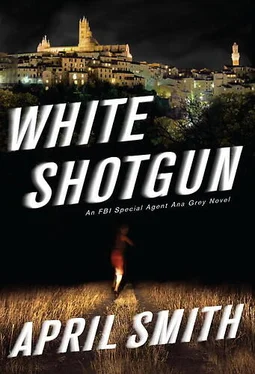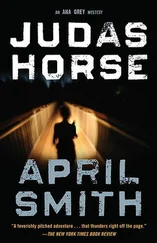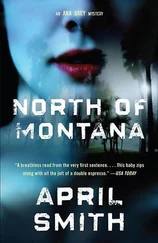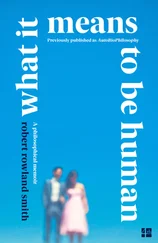April Smith - White Shotgun
Здесь есть возможность читать онлайн «April Smith - White Shotgun» весь текст электронной книги совершенно бесплатно (целиком полную версию без сокращений). В некоторых случаях можно слушать аудио, скачать через торрент в формате fb2 и присутствует краткое содержание. Год выпуска: 2011, ISBN: 2011, Жанр: Триллер, на английском языке. Описание произведения, (предисловие) а так же отзывы посетителей доступны на портале библиотеки ЛибКат.
- Название:White Shotgun
- Автор:
- Жанр:
- Год:2011
- ISBN:978-0-307-59679-6
- Рейтинг книги:4 / 5. Голосов: 1
-
Избранное:Добавить в избранное
- Отзывы:
-
Ваша оценка:
- 80
- 1
- 2
- 3
- 4
- 5
White Shotgun: краткое содержание, описание и аннотация
Предлагаем к чтению аннотацию, описание, краткое содержание или предисловие (зависит от того, что написал сам автор книги «White Shotgun»). Если вы не нашли необходимую информацию о книге — напишите в комментариях, мы постараемся отыскать её.
White Shotgun — читать онлайн бесплатно полную книгу (весь текст) целиком
Ниже представлен текст книги, разбитый по страницам. Система сохранения места последней прочитанной страницы, позволяет с удобством читать онлайн бесплатно книгу «White Shotgun», без необходимости каждый раз заново искать на чём Вы остановились. Поставьте закладку, и сможете в любой момент перейти на страницу, на которой закончили чтение.
Интервал:
Закладка:
“I notice you don’t have security.” Nicosa reacts as if he’d never considered it. “No security?” “Do you have an alarm system? I don’t see one.” I gesture toward the cloistered yard, apparently unchanged since 1132. “You’re isolated, with access from every direction. Forgive me.” I smile. “You asked what I do in Los Angeles? I sell home security systems.” When making up a false identity on the spot, it is best to stick to something you know.
“We’ll have to talk about that,” he promises.
I exchange a look with Cecilia, expecting a conspiratorial smile in return for keeping my ties to the Bureau a secret, but she lowers her eyes, unwilling to connect.
Inside the family quarters is the layered smell of old fires. The floorboards creak as we enter what used to be a small chapel, with pale stone walls curving toward the ceiling like hands steepled in prayer. The room has been modernized with milk-white couches and a flat-screen TV. In a niche that must have once held a statue, someone has placed a miniature wine cask. High in the vaulted ceiling is a tiny six-paned window, the only source of natural light. I imagine that if the chrome lamps weren’t shining, throwing a warm glow into the corners, it would be black as a closet in here.
We pass through a huge dining hall where naked plywood tables and folding chairs are stacked — before or after a party, or maybe always at the ready. The windows have been jazzed up with embroidered curtains, and one whole wall is a cupboard for china. The kitchen is cavernous, but it is the kitchen of a working family. A funnel-shaped brick fireplace dominates, with well-used iron grills. Do they actually cook over an open fire? There is also, of course, a gourmet range in stainless steel, and a pair of fancy refrigerators. Track lighting looks down on a ten-foot granite island with built-in sinks for preparing the baskets of tomatoes and baby zucchini, great bunches of sage and basil and loaves of bread that are making me faint with hunger.
Still in heels and the silk dress, Cecilia trades the doctor’s coat for an apron, refusing offers of help.
“No, no. You relax. I hope your ride on the bus was okay. Giovanni picked you up?” “Everything was fine. He said he had been studying — seems like a good kid.” “We are proud of him. He is going to carry the flag for our contrada during Palio. It’s an honor. They always pick the most handsome young man.” She caresses Nicosa’s cheek. “It used to be his father. Still is.” Nicosa removes Cecilia’s hand and kisses her palm with the passing intimacy of a long marriage. “Where is Giovanni?” he asks.
“He’s at soccer. After school he practices the flag, and then soccer,” she tells me with a smile. “Busy schedule.” “We had a nice talk.” I describe our conversation about his love for Siena.
“That’s more than we talk to Giovanni in a week,” marvels Nicosa.
Cecilia says, “He likes to talk in the car.” “Or shopping. He’ll quote Dante if you buy him a pair of tennis shoes.” Cecilia frowns, retrieving a melon from the window, swinging her hips around the kitchen in sensual display; just like Nicosa, she’s sexual and distant at the same time.
“You’re making him out to be a brat. He is not a brat,” Cecilia says.
“I would never say that about my son! He’s a good student and stays out of trouble; what more can we ask? Do you need me to cut the prosciutto?” “Non ora. Fra un pò.”
“Voglio vedere Giovanni giocare.”
“Va bène.”
Her husband leaves, and Cecilia lets out a sigh that probably says more than she would like me to know at this point. Her demeanor is guarded. Despite the excited welcome, she is hovering on the other side of the island and keeping her eyes on the food prep, as if to maintain a distance while evaluating the stranger in her kitchen.
“Nicoli wants to see a little of Giovanni’s practice,” she says. “We will have something to eat in a minute. I would have met you at the bus, but we had to perform an emergency C-section.” “Mom and baby okay?”
“The baby will have some problems,” she says, ending the discussion.
I try to let things unwind as if I really were just a long-lost relation. There are moments of awkward silence. She takes a bowl from the refrigerator and starts dipping zucchini blossoms into a batter she must have prepared between surgeries. I thought I was efficient. But these are petty thoughts. This is an industrious woman who is also a publicly betrayed wife. Despite all that, she and her husband seem to be — wildly and improbably — in love. It makes me see that Sterling and I are still way at the beginning.
“Do you think Nicoli bought my story about selling security systems?” “Sounded good to me,” she says. “Do you really?” “When I was on the robbery squad at the FBI, I used to collect the tapes from the surveillance cameras in banks. It’s about as technical as popping out a CD.” “Don’t worry; Nicoli wasn’t paying attention.” “But you’re still afraid to tell him I’m an agent.” “Not afraid. It’s just not a good time. He’s sensitive about politics.” “Is something wrong?”
“Not at all,” Cecilia answers in a reserved tone, confirming my sense that we have taken several steps back from the warmth of our initial contact. “Tell me about you. Are you married? Do you have children?” “No children, married to the job.” Don’t push it. We have time. “How did you find out about me in the first place?” “I first heard your name when I was a child. My father told us that we had a relative in America named Ana, and if we ever wanted to meet her, we must work hard in school so we could visit. I never knew if you were real or something he invented so we’d get good grades. Who in your family came from El Salvador?” A delicate aroma of dough sizzling in olive oil arises from a large copper skillet.
“My father. His name was Miguel Sanchez.” Cecilia freezes on the spot, still gripping a slotted spoon. “Your father was Miguel Sanchez? I didn’t realize he was your father.” “What did you think?”
She fumbles. “I thought maybe he was an uncle or a cousin and that you and I were distantly related. But, Ana, he is my father, too.” I am not impressed. “Seriously, it’s a common name.” “Yes, it is a common name,” she snaps impatiently. “But for him to speak of a girl named Ana in America? That is too much of a coincidence. Did you know he was from the town of Cojutepueque?” “I thought it was called La Palma, but that could be wrong.” Cecilia has put down the spoon and turned off the stove.
“It’s in the mountains, thirty-five minutes from the capital, San Salvador. My mother was Eulalia. Together they owned a fish market. It started out as a space in the mercado but eventually they bought three stalls. She ended up running it because Papa wasn’t always there. He was often in America.” “Where in America?”
“Nobody knew. At times he would send money, so maybe that’s why she tolerated his absence. He would come and go. Then one day he never came back.” “Do you have a photo of him?”
“Somewhere.”
“It doesn’t matter. I don’t remember what he looked like. He died when I was five, and my grandfather threw out all the pictures.” Cecilia is shocked. “He died?”
“Yes. I’m sorry.”
“How?”
I hesitate. “Are you sure you want to know?” She nods. “He was murdered.” “Did they ever find the killer?” “No. The case was never pursued. In fact, there never was a case.” “ Capito. Because he was a Spanish man, in the country illegally.” I don’t answer.
Cecilia brushes moist eyes. “We never knew what happened to him,” she murmurs. “I was a teenager when he left for good.” “This is crazy.”
Читать дальшеИнтервал:
Закладка:
Похожие книги на «White Shotgun»
Представляем Вашему вниманию похожие книги на «White Shotgun» списком для выбора. Мы отобрали схожую по названию и смыслу литературу в надежде предоставить читателям больше вариантов отыскать новые, интересные, ещё непрочитанные произведения.
Обсуждение, отзывы о книге «White Shotgun» и просто собственные мнения читателей. Оставьте ваши комментарии, напишите, что Вы думаете о произведении, его смысле или главных героях. Укажите что конкретно понравилось, а что нет, и почему Вы так считаете.












